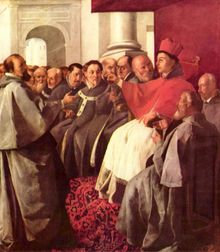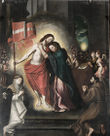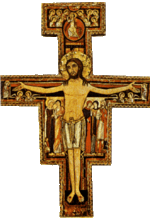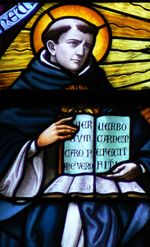Bonaventure
| Saint Bonaventure | |
|---|---|
 Saint Bonaventure |
|
| Bishop, Confessor, Doctor of the Church | |
| Born | 1221 Bagnoregio, Province of Viterbo, Latium, Papal States (now modern-day Italy) |
| Died | July 15, 1274 Lyon, Lyonnais, Kingdom of Arles (now modern-day France) |
| Venerated in | Roman Catholic Church |
| Canonized | April 14, 1482, Rome by Pope Sixtus IV |
| Feast | 15 July second Sunday in July (General Roman Calendar, 1482-1568) 14 July (General Roman Calendar, 1568-1969) |
| Attributes | Cardinal's hat; ciborium; Holy Communion; cardinal in Franciscan robes, usually reading or writing |
Bonaventure (Italian: San Bonaventura; 1221[1] – 15 July 1274), born John of Fidanza (Italian: Giovanni di Fidanza), was an Italian medieval scholastic theologian and philosopher, the seventh Minister General of the Order of Friars Minor. He was a Cardinal Bishop of Albano. He was canonized on 14 April 1482 by Pope Sixtus IV and declared a Doctor of the Church in the year 1588 by Pope Sixtus V. He is known as the "Seraphic Doctor" (Latin: "Doctor Seraphicus"). Many writings believed in the Middle Ages to be his are now collected under the name Pseudo-Bonaventura.
Contents |
Life
He was born at Bagnoregio in Latium, not far from Viterbo. Almost nothing is known of his childhood, other than the names of his parents, Giovanni di Fidanza and Maria Ritella. He is said to have received his cognomen of Bonaventure ("good fortune") when he was cured from a serious childhood illness through the intercession of Saint Francis of Assisi.
He entered the Franciscan order in 1243 and studied at the University of Paris, possibly under Alexander of Hales, and certainly under Alexander's successor, John of Rochelle. In 1253 he held the Franciscan chair at Paris and was proceeded as master of theology. Unfortunately for Bonaventure, a dispute between secular and mendicants delayed his reception as master until 1257, where his degree was taken in company with St Thomas Aquinas.[2] Three years earlier his fame had gained for him the duty of lectoring on the The Four Books of Sentences - a book of theology written by Peter Lombard in the 12th century - and in 1255 he received the degree of master, the medieval equivalent of doctor. The year after he successfully defended his order against the reproaches of the anti-mendicant party, he was elected general of his order. On 24 November 1265, he was selected for the post of Archbishop of York; however, he was never consecrated and resigned the appointment in October 1266.[3] It was by his order that Roger Bacon, a Franciscan friar himself, was interdicted from lecturing at Oxford and compelled to put himself under the surveillance of the order at Paris.

Bonaventure was instrumental in procuring the election of Pope Gregory X, who rewarded him with the titles of Cardinal and Bishop of Albano, and insisted on his presence at the great Council of Lyon in 1274. There, after his significant contributions led to a union of the Greek and Latin churches, Bonaventure died suddenly and in suspicious circumstances. The Catholic Encyclopedia has citations which suggest he was poisoned. The only extant relic of the saint is the arm and hand with which he wrote his Commentary on the Four Books of Peter Lombard, which is now conserved at Bagnoregio, in the parish Church of St. Nicholas.
Feast Day
Bonaventure's feast day was included in the General Roman Calendar immediately on his canonization in 1482. It was at first celebrated on the second Sunday in July, but was moved in 1568 on 14 July: 15 July, the anniversary of his death, was at that time taken up with the feast of Saint Henry. It remained on that date, with the rank of "Double", until 1962, when it was given the new classification of "Third-Class Feast". In 1969 it was classified as an obligatory "Memorial" and assigned to the date of his death, 15 July.[4]
Philosophy and works
 |
|
Articles Early period 13-14th centuries 15-16th century 17-18th centuries 19th century 20th century |
Bonaventure was formally canonized in 1484 by the Franciscan Pope Sixtus IV, and ranked along with St Thomas Aquinas as the greatest of the Doctors of the Church by another Franciscan Pope Sixtus V, in 1587. His works, as arranged in the most recent Critical Edition of his works by the Quaracchi Fathers (Collegio S. Bonaventura), consist of a Commentary on the Sentences of Lombard, in four volumes, and eight other volumes, among which are a Commentary on the Gospel of St Luke and a number of smaller works; the most famous of which are Itinerarium Mentis ad Deum, Breviloquium, De Reductione Artium ad Theologiam, Soliloquium, and De septem itineribus aeternitatis, in which most of what is individual in his teaching is contained. Nowadays German philosopher Hattrup denies that De Reductione Artium ad Theologiam might be written by Bonaventure. The style of thinking does not match the original style; this is ecstatic, but De Reductione works comprehending[5].
In philosophy Bonaventure presents a marked contrast to his contemporaries, Roger Bacon and St Thomas Aquinas. While these may be taken as representing, respectively, physical science yet in its infancy, and Aristotelian scholasticism in its most perfect form, he brings before us the mystical and Platonizing mode of speculation which had already, to some extent, found expression in Hugo and Richard of St. Victor, and in Saint Bernard of Clairvaux. To him, the purely intellectual element, though never absent, is of inferior interest when compared with the living power of the affections or the heart. He used the authority of Aristotle in harmony with Scriptural and Patristic texts, and attributed much of the heretical tendency of the age to the attempt to divorce Aristotelian philosophy from Catholic Theology. Like St. Thomas Aquinas, with whom he shared numerous profound agreements in matters theological and philosophical, he combated the Aristotelian notion of the eternity of the world vigorously. St Augustine, who had imported into the west many of the doctrines that would define scholastic philosophy, was an incredibly important source of Bonaventure's Platonism. Augustine himself had engaged Neoplatonism, a school of Platonism distinct from that of Plato, mostly through Plotinus but possibly through Iamblichus as well; it is likely that Augustine had never encountered a work written by Plato himself. Another prominent influence was that of a mystic passing under the name of Dionysius the Areopagite.
Bonaventure accepts the Platonic doctrine that ideas do not exist in rerum natura, but as ideals exemplified by the Divine Being, according to which actual things were formed; and this conception has no slight influence upon his philosophy. Like all the great scholastic doctors he starts with the discussion of the relations between reason and faith. All the sciences are but the handmaids of theology; reason can discover some of the moral truths which form the groundwork of the Christian system, but others it can only receive and apprehend through divine illumination. In order to obtain this illumination, the soul must employ the proper means, which are prayer, the exercise of the virtues, whereby it is rendered fit to accept the divine light, and meditation which may rise even to ecstatic union with God. The supreme end of life is such union, union in contemplation or intellect and in intense absorbing love; but it cannot be entirely reached in this life, and remains as a hope for futurity. The mind in contemplating God has three distinct aspects, stages or grades—the senses, giving empirical knowledge of what is without and discerning the traces (vestigia) of the divine in the world; the reason, which examines the soul itself, the image of the divine Being; and lastly, pure intellect (intelligentia), which, in a transcendent act, grasps the Being of the divine cause.
To these three correspond the three kinds of theology: theologia symbolica, theologia propria and theologia mystica. Each stage is subdivided, for in contemplating the outer world we may use the senses or the imagination; we may rise to a knowledge of God per vestigia or in vestigiis. In the first case the three great properties of physical bodies—weight, number, measure,--in the second the division of created things into the classes of those that have merely physical existence, those that have life, and those that have thought, irresistibly lead us to conclude the power, wisdom and goodness of the Triune God. So in the second stage we may ascend to the knowledge of God, per imaginem, by reason, or in imagine, by the pure understanding (intellectus); in the one case the triple division—memory, understanding and will,--in the other the Christian virtues—faith, hope and charity,--leading again to the conception of a Trinity of divine qualities—eternity, truth and goodness.
In the last stage we have first intelligentia, pure intellect, contemplating the essential being of God, and finding itself compelled by necessity of thought to hold absolute being as the first notion, for non-being cannot be conceived apart from being, of which it is but the privation. To this notion of absolute being, which is perfect and the greatest of all, objective existence must be ascribed. In its last and highest form of activity the mind rests in the contemplation of the infinite goodness of God, which is apprehended by means of the highest faculty, the apex mentis or synderesis. This spark of the divine illumination is common to all forms of mysticism, but Bonaventura adds to it peculiarly Christian elements. The complete yielding up of mind and heart to God is unattainable without divine grace, and nothing renders us so fit to receive this gift as the meditative and ascetic life of the cloister. The monastic life is the best means of grace.
Bonaventure, however, is not merely a meditative thinker, whose works may form good manuals of devotion; he is a dogmatic theologian of high rank, and on all the disputed questions of scholastic thought, such as universals, matter, the principle of individualism, or the intellectus agens, he gives weighty and well-reasoned decisions. He agrees with Saint Albert the Great in regarding theology as a practical science; its truths, according to his view, are peculiarly adapted to influence the affections. He discusses very carefully the nature and meaning of the divine attributes; considers universals to be the ideal forms pre-existing in the divine mind according to which things were shaped; holds matter to be pure potentiality which receives individual being and determinateness from the formative power of God, acting according to the ideas; and finally maintains that the intellectus agens has no separate existence. On these and on many other points of scholastic philosophy the "Seraphic Doctor" exhibits a combination of subtlety and moderation, which makes his works particularly valuable.
Places, churches, schools, universities and literary characters named in his honor
- The town of Bonaventure, Quebec, Canada
- Bonaventure Highway in Quebec
- Place Bonaventure and the adjacent Bonaventure Metro Station in Montreal, Quebec
- Bonaventure Island and the Bonaventure River in the Gaspé Peninsula Region of Quebec
- St. Bonaventure's College, a private Roman Catholic school, in Newfoundland and Labrador, Canada
- St Bonaventure's Catholic Comprehensive School, in Forest Gate, London, England
- The City of Ventura, California, officially named San Buenaventura, the county seat of Ventura County, California, in the United States
- St. Bonaventure University, a Franciscan university, in Allegany, New York
- The Municipality of Buenaventura on the Pacific Coast of Colombia
- The cities of San Benaventura in Chihuahua and San Buenaventura, Coahuila in Mexico and the State of San Benaventura
References
- ↑ M. Walsh, ed. Butler's Lives of the Saints. (New York: HarperCollins Publishers, 1991), 216.
- ↑ Knowles, Davis (1988). The Evolution of Medieval Thought (Second Edition, revised ed.). Edinburgh Gate: Longman Group. ISBN 0-582-4946-5.
- ↑ Fryde, E. B.; D.E. Greenway, S. Porter and I. Roy (1996). Handbook of British Chronology (Third Edition, revised ed.). Cambridge: Cambridge University Press. pp. 282. ISBN 0-521-56350-X.
- ↑ Calendarium Romanum (Libreria Editrice Vaticana, 1969), pp. 97 and 130
- ↑ Hattrup, Dieter (1993). Ekstatik der Geschichte. Die Entwicklung der christologischen Erkenntnistheorie Bonaventuras. Paderborn: Schöningh. ISBN 3-506-76273-7.
 This article incorporates text from a publication now in the public domain: Chisholm, Hugh, ed (1911). Encyclopædia Britannica (Eleventh ed.). Cambridge University Press.
This article incorporates text from a publication now in the public domain: Chisholm, Hugh, ed (1911). Encyclopædia Britannica (Eleventh ed.). Cambridge University Press.- Bonaventure. Ewert Cousins, translator (The Classics of Western Spirituality ed.). Mahwah, New Jersey: Paulist Press. 1978. ISBN 0-8091-2121-2.
External links
- "St. Bonaventure, Cardinal, Bishop, and Doctor of the Church", Butler's Lives of the Saints
- Saint Bonaventure entry by Tim Noone and R. E. Houser in the Stanford Encyclopedia of Philosophy
- St Bonaventure from the Franciscan Archive.
- S Bonaventura: Opera Omnia Peltiero Edente (Latin original texts).
| Catholic Church titles | ||
|---|---|---|
| Preceded by John of Parma |
Minister General of the Order of Friars Minor 1257–1274 |
Succeeded by Jerome of Ascoli |
| Preceded by William Langton |
Archbishop of York 1265–1266 |
Succeeded by Walter Giffard |
|
|||||||||||||||||||||||||||||||||||||||||
|
||||||||||||||||||||||||||||||||||||||||||
|
|||||
|
|||||

